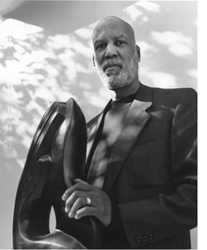 “Come, let us reason together and learn to solve the puzzle of race and racism. From the scrolls of ancient prophets to the best thinkers of our current age, we are admonished to seek wisdom. Now is the time, now is the hour.”
“Come, let us reason together and learn to solve the puzzle of race and racism. From the scrolls of ancient prophets to the best thinkers of our current age, we are admonished to seek wisdom. Now is the time, now is the hour.”
- Dr. Terrence Roberts
We invite you to be part of this community conversation and unique thought journey, led by Dr. Terrence Roberts, one of the Little Rock Nine: icon, psychologist, university professor. You will be joined in conversation with families of diverse backgrounds, races, and religions to reflect, relate, and connect. The three sessions designed by Dr. Roberts are each devoted to an exploration of the Self.
The multigenerational Zoom sessions include prompts for self-reflection, virtual history tours and videos, and hands-on tools you can use to navigate the daunting terrain of facing injustice. Recommended for ages 12 and up.
Session One: Learning about Self as Family Member
Participants will be invited to consider the efficacy of increasing their own levels of self-awareness, to explore the value of being “in family,” to develop a working knowledge of “relational integrity,” to learn the ways in which communication between family members can be enhanced, and to commit to learning together as a family. Family members will be encouraged to share the ways they have attempted to teach each other about race and racism. It is anticipated that stories about the impact of race and racism on the family will be an integral part of this session.
Session Two: What Happens at the Intersection of Self and Other?
This session offers family members an opportunity to discover more about overt as well as covert actions that occur when people encounter others outside the family framework. How prepared are family members to handle the tensions, misunderstandings, harsh words, micro aggressions and other such phenomena associated with the ideology of racism? The Y+ O = R equation will be used to demonstrate how relationships might be formed with those deemed to be “other” in the mind of family members. We will also explore how we learn who others are and the rules of engagement for those others and family members.
Session Three: Self as Committed Learner
It is in this session that the history of race in America will be explored with guest historian Dr. Kenya Davis-Hayes. Neither self nor other exists in a vacuum but the absence of foundational information about our historical roots leaves us open to conjecture, folklore, held beliefs, prejudicial opinions, and other such dogmatic ways of thinking. Our primary goal for this session is to motivate the participants to develop or reignite a desire to learn about our shared history.
When learning is an option, there is no excuse for ignorance. Building on this notion, we will encourage participants to seek information, find wisdom, and change the narrative that has been playing on their mental screens. We are all part of recorded history but we do not have to be shaped by the generally accepted historical conclusions.
| Suggested Resources from Dr. Terrence Roberts The following works are suggested as reading for you to add to your storehouse of information about issues of race and racism in the United States of America. Enter these pages with open minds and a willingness to challenge your own belief systems. Fredrickson, George M., Racism: A Short History, Princeton University Press, 2000 An erudite comparison of racism and anti-Semitism throughout Western history, Fredrickson’s amazingly concise book explains how medieval anti-Semitism influenced the racist rationalization of the African slave trade; shows how the Enlightenment and Romanticism opened up new avenues for thinking about Jews and slavery; and contrasts American Jim Crow laws, Nazi Germany’s Aryan nation and South African apartheid. Lipsitz, George, The Possessive Investment in Whiteness: How White People Profit From Identity Politics, Philadelphia, Temple University Press, 1998 This book argues that both public policy and private prejudice have created a “possessive investment in whiteness” that is responsible for the racialized hierarchies in our society. I use the term “possessive investment” both literally and figuratively. Whiteness has a cash value; it accounts for advantages that come to individuals through profits made from housing secured in discriminatory markets, through the unequal educations allocated to children of different races, through insider networks that channel employment opportunities to the relatives and friends of those who have profited most from present and past racial discrimination, and especially through intergenerational transfers of inherited wealth that pass on the spoils of discrimination to succeeding generations.”(From the introduction to the book) Rothstein, Richard, The Color of Law: A Forgotten History of How Our Government Segregated America, Liveright Publications, New York, 2017 Rothstein argues with exacting precision and fascinating insight how segregation in America – the incessant kind that continues to dog our major cities and has contributed so much recent social strife – is the byproduct of explicit government policies at the local, state, and federal levels. The private activity, (de facto segregation) would not have been possible without government policies designed to insure the separation of African Americans from whites. |